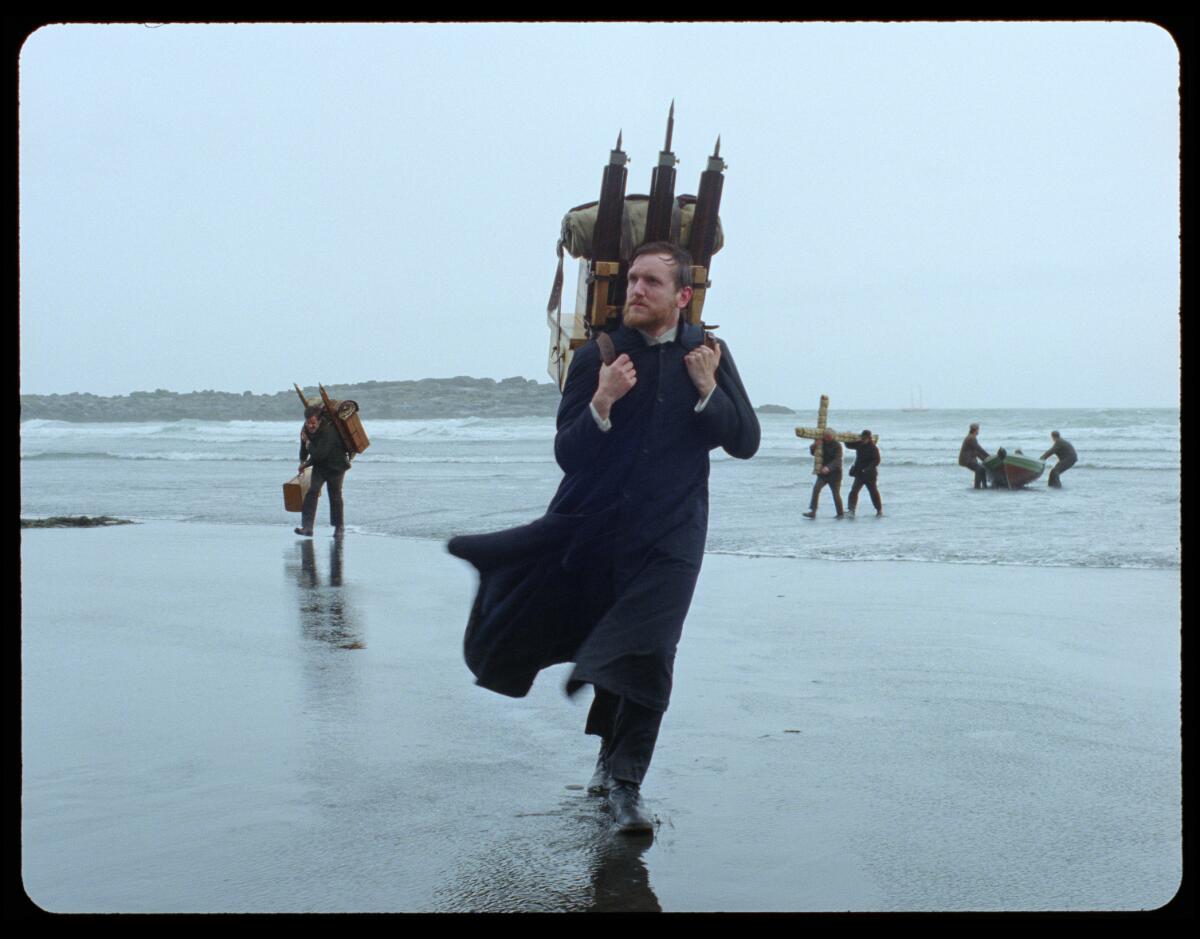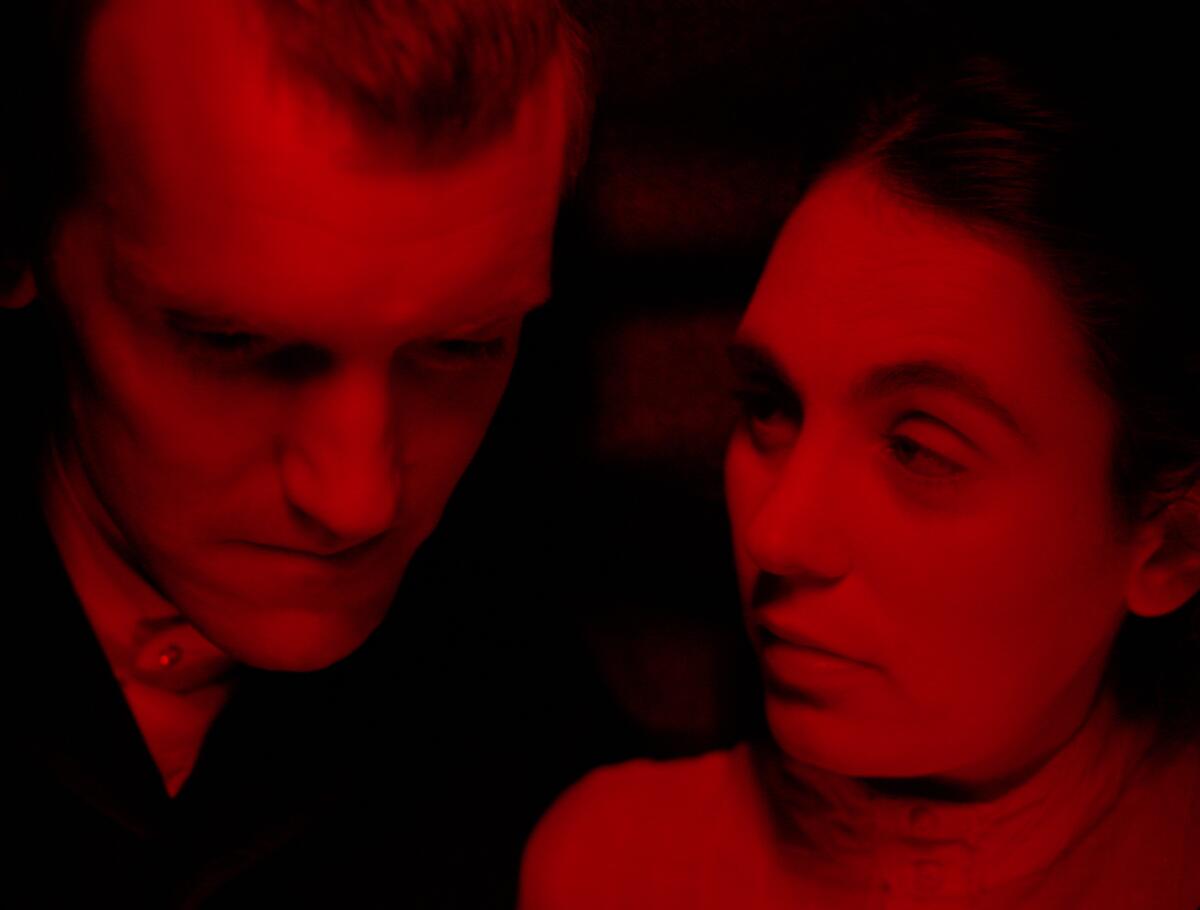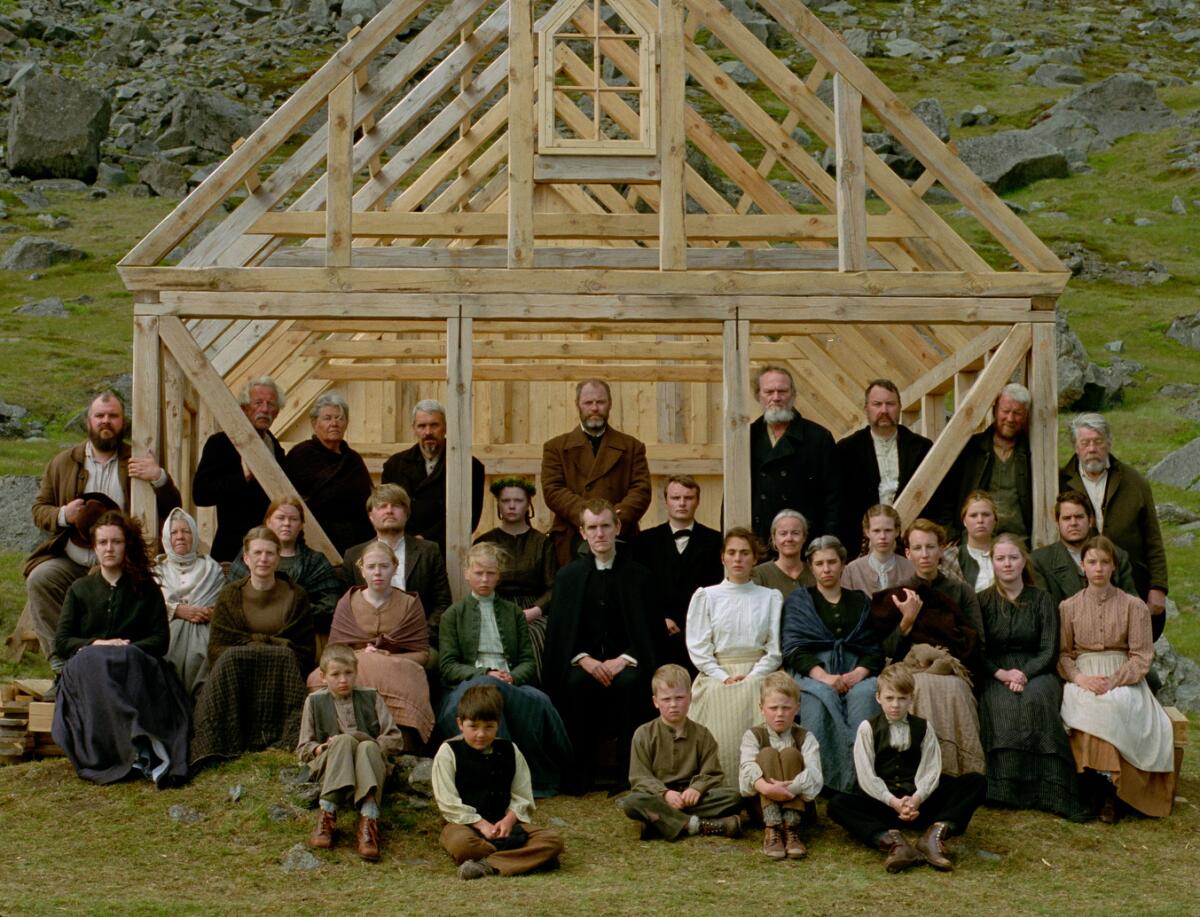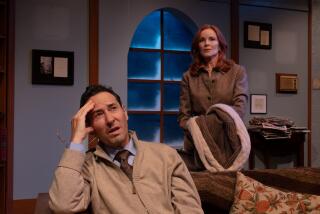Review: The stunning drama ‘Godland’ is an epic tale of ice and men

In the bleak and beautiful “Godland,” a 19th century Danish priest named Lucas (Elliott Crosset Hove) makes the long, arduous trek north to Iceland, where he seeks to build and lead a church in a small coastal settlement.
Lucas also happens to be an amateur photographer, and the heavy camera equipment he carries on his back suggests he isn’t the brightest or most practical of ministers. Rather than simply sail to his destination, which would be safer and faster, he has decided to travel on foot and horseback over miles of harsh, unforgiving terrain, taking pictures of the Icelandic people and landscapes he encounters along the way. It’s an artistic impulse and an arrogant, imperialist one, and it will have severe consequences for Lucas and those accompanying him on his journey.
Lucas is of course an unwitting camera subject himself, namely that of the gifted Icelandic writer-director Hlynur Pálmason and his cinematographer, Maria von Hausswolff. “Godland,” stunningly shot on 35-millimeter film, mimics the look of old photographs with its square frames and rounded corners — a visual choice that initially suggests we’re discovering Iceland and its natural wonders through Lucas’ eyes.
Some scenes do appear to have been filmed over the priest’s shoulder, such as an intimately detailed sequence in which he painstakingly sharpens his photographic plates and prepares them with egg white. (The movie was loosely inspired by seven wet-plate photographs, taken by a Danish priest, that are considered the first visual record of Iceland’s southeastern coast.)
For your safety
The Times is committed to reviewing theatrical film releases during the COVID-19 pandemic. Because moviegoing carries risks during this time, we remind readers to follow health and safety guidelines as outlined by the CDC and local health officials.
But while this is Lucas’ mission and his story, it pointedly does not unfold entirely from his perspective. At times, Pálmason frames the action from a God’s-eye distance, dwarfing Lucas and his fellow travelers against grassy slopes and craggy mountains. Later in the story, the editor, Julius Krebs Damsbo, will cycle through the seasons in a few brief still-frame montages, focusing on a stretch of wilderness or a dead horse’s remains, as if to remind us of the impermanence and cosmic insignificance of all living things.

From time to time, too, the camera aligns itself with the silent, contemptuous gaze of Ragnar (Ingvar Eggert Sigurðsson), the Icelandic farmer hired to guide Lucas on his way north. For if “Godland” is a pitiless epic of man versus nature, it also pits man against man.
Ragnar, the kind of fellow for whom riding a horse and fording a river are second nature, despises Lucas from the moment they meet, and the antipathy proves more than mutual. It doesn’t help that Lucas can’t speak Icelandic, and that Ragnar can’t or won’t speak Danish. (Their kindly interpreter, played by Hilmar Guðjónsson, has his work cut out for him; so do the movie’s carefully delineated English subtitles.) Both men are fatally stubborn, though Ragnar is the humbler, wiser one by far. He knows the region and its elemental perils, and he knows only a fool would try to test those perils or bend them to his will.
Lucas has no such knowledge and even less self-knowledge, and his trip, which he only barely survives (at least one fellow traveler does not), is a record of persistent arrogance, reckless stupidity and dismal failure. And Crosset Hove’s performance, from which he has purged every whisper of charm if not sympathy, is an excellent reminder of the difference between a protagonist and a hero. Kindness and patience, among other Christian ministerial imperatives, seldom manifest themselves in Lucas’ pinched, unsmiling countenance, his hard stares and occasional death glares. Nor does he seem to evince any consideration or curiosity with regard to the locals he meets and sometimes photographs. Iceland itself, with its stunning rock formations, crashing waterfalls and impossibly gorgeous sunsets, duly transfixes him, but that vindicates only his eyesight, not his character.
“Godland” isn’t Pálmason’s first study of sociopathy in frigid isolation; nor is it his first time working with the well-paired Crosset Hove and Sigurðsson. (You can see them in the director’s earlier features “Winter Brothers” and “A White, White Day,” respectively.) Even more than “Silence,” Shūsako Endō’s much-adapted novel about 17th century Portuguese missionaries in Japan, the movie is a withering chronicle of spiritual hubris.
Unsurprisingly, it’s also a story about the willful blindness of colonialism, and one that benefits from Pálmason’s own dual-layered identity as an Icelandic-born filmmaker who spent many years studying and living in Denmark. From the opening scene of Lucas receiving his instructions from an older priest, there’s a clear, if understated, tension between the Danish ruling powers and what they assume to be their untamed island subjects, so desperate in their need for order, civilization and God.

That assumption is quietly, surgically dismantled once Lucas arrives at the settlement and the difficult work of church building begins. His routine, though easier and less physically arduous than his travels, feels no less calculated to reveal his every fault and weakness. Lucas spends some time recuperating in the home of a farmer, Carl (a superbly restrained Jacob Hauberg Lohmann), who, not unlike Ragnar, sizes up the priest with withering accuracy. Carl’s two daughters — the younger, free-spirited Ida (Ída Mekkín Hlynsdóttir) and especially the older, marryable Anna (Vic Carmen Sonne) — look upon their visitor more favorably, even as they play their parts in a drama that is destined to end badly for him.
That inevitability might leach the movie of some surprise in its grim final moments, which is not to say that the rest of this steadily gripping, often mordantly funny movie is easy to predict or pin down. While more than one of Lucas’ future parishioners professes a weary disinterest in God, Pálmason himself seems to strike a more ambivalent pose. The problem with this priest — one of them, anyway — may not be an excess of spiritual fervor but rather a dearth of it, a lack of reverence for the beauty that Pálmason’s camera exalts in every magisterial frame. Lucas may be a blind wretch, but the creation through which he stumbles is a source of never-ending awe.
‘Godland’
In Danish and Icelandic with English subtitles
Not rated
Running time: 2 hours, 23 minutes
Playing: Starts Feb. 10 at Laemmle Glendale and Laemmle Monica Film Center, Santa Monica
More to Read
Only good movies
Get the Indie Focus newsletter, Mark Olsen's weekly guide to the world of cinema.
You may occasionally receive promotional content from the Los Angeles Times.











